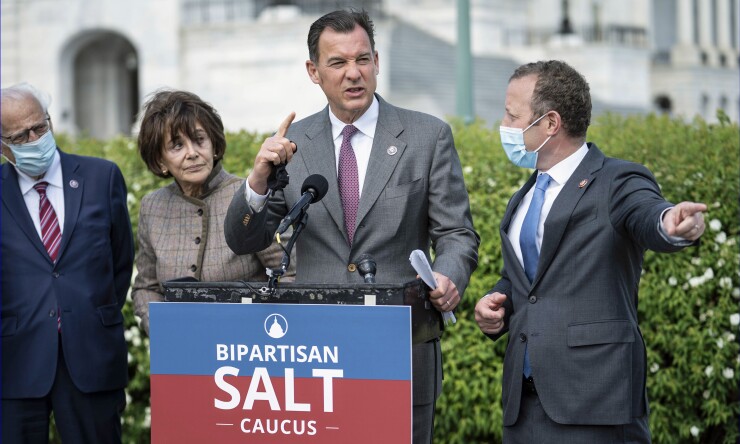Advocates of repealing the cap on the state and local tax deduction are hopeful negotiations are moving toward that measure's inclusion in the multi-trillion dollar reconciliation package Democrats hope to pass in the coming weeks, though the ongoing talks are injecting huge uncertainty into what that package will eventually look like.
Rep. Tom Suozzi, D-N.Y. this week repeated his belief that an agreement regarding the state and local tax deduction, or SALT, could come soon.
“As this big week in DC moves ahead, I am continuing to pull out all the stops on repealing the SALT cap,” Suozzi said in a tweet.
Suozzi, who has
Democrats have only slim margins in both chambers of Congress and Republicans are universally opposed to the reconciliation package, so a revolt by Suozzi and like-minded Democrats could block its passage.
“No SALT, no deal!,” Suozzi said Wednesday.

The question loomed large on Thursday as to whether a stalemate has been reached on the reconciliation bill. The Biden White House remains in discussions with moderate Senate Democrats, notably West Virginia's Joe Manchin, who does not favor the $3.5 billion price tag. The initial language of that bill did not address the cap on state and local tax deductions for federal income tax.
Ushered in as part of Donald Trump’s 2017 Tax Cuts and Jobs Act, the SALT cap places a $10,000 limit on the amount of state and local taxes that taxpayers can deduct from federal obligations.
Restoring the SALT deduction has been a goal for municipal issuers and a significant issue--particularly for lawmakers from high tax states, such as New York, California and New Jersey.
SALT is also important to local government and public employee groups who say that the cap constrains the ability of cities, towns, villages, and school districts to raise additional revenue.
“If the federal government puts a thumb on how much state and locals can effectively raise revenues for their own communities then that in and of itself could potentially have an impact on credit ability and the ability to repay debt,” said Emily Brock, director of the federal liaison center at the Government Finance Officers Association.
Brock emphasized that in addition to big urban communities, the SALT cap is “a challenge for lots of other pockets of communities across the country.”
“You don't have to go to New York or California,” Brock said, adding, “You could go to Minneapolis for example, where SALT is a major issue or you could go to Arlington, Virginia where it’s a major issue.”
In April, Suozzi joined a panel of the U.S. Conference of Mayors, along with Marisa Waxman, City of Philadelphia budget director who spoke on behalf of GFOA, to advocate for full restoration of the deduction.
Waxman
Suozzi
Meanwhile, some Democrats, like New York Rep. Alexandra Ocasio-Cortez, as well as a number of Republicans, have shown opposition to a full SALT cap repeal, which
Also, the Joint Committee on Taxation reported that a full repeal of the SALT deduction could result in over $88 billion in lost revenue this year.
But Brock sees the SALT cap--and its potential repeal--as an issue that is not merely about Treasury revenue. “It certainly has a derivative effect on the revenue raising capacities for [many] communities,” Brock said.
Early this week, Suozzi told reporters that he felt that the negotiations were moving in the right direction.
However, with the fate of the Democrat’s spending package hanging in the balance, it remains to be seen whether and what changes to the SALT cap will be included in the final bill.





